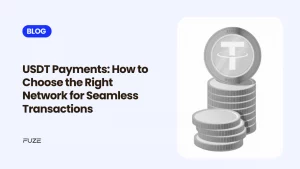Stablecoins are redefining how businesses approach financial transactions, offering a unique combination of stability and utility powered by blockchain technology. As digital currencies pegged to real-world assets like fiat currencies or commodities, stablecoins eliminate the volatility typically associated with cryptocurrencies. This makes them an ideal solution for streamlining payouts, enabling faster, more cost-effective, and globally accessible transactions.
In this blog, we’ll explore the growing adoption of stablecoin payout solutions and how they maximize efficiency, reduce operational costs, and pave the way for innovative approaches to modern financial operations.
What are Stablecoins?
Stablecoins are a type of cryptocurrency that are designed to minimize the volatility associated with digital currencies like Bitcoin or Ethereum. Most cryptocurrencies tend to have extreme price swings, but stablecoins are pegged to the value of an underlying asset, which is usually a fiat currency, such as the US Dollar. This peg means that the value of a stablecoin will remain relatively constant, making it a reliable option for financial transactions.
There are several types of stablecoins, each utilizing different mechanisms to maintain their value:
Fiat-collateralized stablecoins – These stablecoins are backed by a reserve of fiat currency in a bank account or with a custodian. For example, Tether (USDT) and USD Coin (USDC) are both backed 1:1 by the US Dollar.
Crypto-collateralized stablecoins – These stablecoins are collateralized by a reserve of cryptocurrencies. Typically, they are over-collateralized to balance out the volatility of the collateral. Examples include DAI and sUSD.
Algorithmic stablecoins – Instead of relying on fiat or crypto-backed stablecoins, algorithmic stablecoins operate based on smart contracts that execute algorithms to control the supply and demand of the token to maintain price stability.
Why Use Stablecoin Payout Solutions?
Stablecoin payouts have several benefits over traditional fiat payments and other cryptocurrencies, making them an exciting option for businesses in various industries.
Here are some reasons why stablecoin payouts are an efficient way to conduct financial transactions efficiently.
- Volatility Reduction
One of the key benefits of using stablecoins for payouts is the reduced volatility. Cryptocurrencies such as Bitcoin and Ethereum can experience drastic price fluctuations within short periods of time, making them unreliable for everyday payments. Stablecoins, on the other hand, offer price stability, making them ideal for businesses that need to make predictable, consistent payouts. This stability allows businesses to mitigate risk and ensure that the value of their transactions remains constant.
For instance, if a company has to pay $1,000 to a supplier, using a cryptocurrency like Bitcoin might result in the supplier receiving a different value due to price volatility. With stablecoins like USDT or USDC, however, the value of the payment is maintained at $1,000, eliminating the possibility of confusion or loss of value.
- Faster Transactions and Lower Fees
Stablecoins run on blockchains which process transactions way faster than the traditional banks. Transfer of funds across banks or internationally takes at least three days, sometimes even a week, with hefty transaction costs. With the use of stablecoins, businesses can transfer funds instantly with no geographical constraint and for a minimal fee.
In addition, stablecoin payments are usually processed 24/7, meaning businesses can make payments and receive funds at any time without having to rely on banking hours. This speed and convenience make stablecoin payouts an attractive alternative to traditional payment methods.
- Global Accessibility
Blockchain networks are decentralized and operate on a global scale, allowing businesses to send payments to anyone, anywhere in the world. Stablecoins are particularly beneficial for businesses involved in cross-border transactions, as they eliminate the need for currency conversion and the associated costs.
Traditional international payments often involve intermediary banks, which can charge high fees for currency exchange and transfer. By using stablecoins, businesses can bypass these intermediaries and transfer funds directly, reducing both costs and time delays.
- Higher Transparency and Security
Blockchain technology is built on transparency and security. Every transaction made using stablecoins is recorded on a public ledger, which ensures that all payments can be traced and verified. This level of transparency reduces the risk of fraud and makes it easier to audit financial transactions.
Moreover, blockchain networks are highly secure, with encrypted transaction data that protects sensitive financial information. As a result, businesses can have greater confidence in using stablecoins for payouts, knowing that their transactions are secure and transparent.
- Regulatory Compliance
As cryptocurrencies and blockchain technology are becoming more mainstream, regulatory bodies are starting to develop frameworks for their legitimate use. Many stablecoin providers comply with regulatory standards; thus, their tokens are compliant with the requirements set by the authorities in various regions.
For businesses, using a compliant stablecoin for payouts might help them stay on the right side of the law while leveraging the benefits of blockchain technology.
- More Efficient Cash Flow Management
Stablecoin payouts can significantly improve cash flow management for businesses, especially those with international operations or a large volume of transactions. By using stablecoins, businesses can reduce the complexity of dealing with multiple currencies and streamline their financial processes.
Furthermore, the use of smart contracts can automatically trigger stablecoin payouts, thereby eliminating manual intervention and ensuring timely payments. This would help businesses have better control over their financial operations and decrease the administrative burden of traditional payment methods.
How Stablecoin Payout Solutions Work
The process using stablecoin payouts can differ, depending on the platform and the type of stablecoin, but the general flow is relatively straightforward.
Here is a basic overview of how stablecoin payouts typically work:
A Stablecoin Provider – Businesses need to select a stablecoin provider that provides them with the features they require, such as fast transaction speeds, low fees, and compliance with regulators. Popular options include USDC, USDT, DAI, and other major stablecoins.
Funding the Wallet – To make stablecoin payouts, businesses must first fund a digital wallet with the right stablecoins. This can be done by buying stablecoins from exchanges or converting existing cryptocurrency holdings into stablecoins.
Creating Payment Requests – Once the wallet is funded, businesses can create payment requests for vendors, employees, or customers. Payment details, including the amount and recipient address, are entered into the payment platform.
Initiate Payment – After verifying the payment details, the business can initiate the transfer. The payment is processed on the blockchain network, and the recipient receives the stablecoins almost instantly.
Track Payments – The blockchain ledger allows businesses and recipients to track payments in real-time, ensuring transparency and reducing the risk of errors.
Conclusion
Stablecoin payout solutions are an innovative solution for businesses aiming to increase efficiency, reduce costs, and simplify financial operations.
By leveraging the stability of assets like USD-pegged tokens, these solutions address common challenges such as payment volatility, slow transaction speeds, and limited cross-border access. Faster settlements, wider global accessibility, better transparency, and greater regulatory compliance are just some of the reasons why stablecoins represent a future-ready solution for enterprises across different industries.
As blockchain technology continues to reshape financial ecosystems, stablecoin payouts are set to become a cornerstone of modern financial systems, driving innovation and growth in global commerce.
At Fuze, we are at the forefront of this evolution, offering a cutting-edge crypto payment processing platform that empowers businesses to seamlessly integrate stablecoin transactions into their operations. With robust security features, a user-friendly interface, and support for multiple blockchain networks, Fuze ensures that businesses of all sizes can harness the power of stablecoins with ease. Whether you’re looking to streamline payroll, facilitate global remittances, or optimize supplier payments, Fuze provides the tools and expertise to take your financial processes to the next level.
Disclaimer: Virtual assets carry significant risks, including high volatility and potential loss of your entire investment. They are not backed by governmental protections, and recourse may be limited in case of loss. Always assess your risk tolerance, fully understand the risks, and seek independent financial advice if needed before investing.
Frequently Asked Questions
How do stablecoins handle regulatory compliance?
Leading stablecoin issuers and platforms comply with regulations by maintaining reserves audited by third parties and adhering to KYC (Know Your Customer) and AML (Anti-Money Laundering) guidelines.
Can stablecoin payouts work for businesses of all sizes?
Yes, stablecoin payouts are scalable and accessible to businesses of all sizes, from startups to large enterprises. They are particularly beneficial for small businesses aiming to reduce cross-border transaction costs.
How do employees or suppliers receive stablecoin payments?
Recipients can receive payments in their crypto wallets, which they can later convert to local fiat currency using cryptocurrency exchanges or retain as stablecoins for future transactions.
What are some common use cases for stablecoin payout solutions?
Stablecoin payouts are used for:
- Employee payroll.
- Freelance payments.
- Supplier and vendor settlements.
- International remittances.
- Incentive programs or rewards.
Are there risks associated with using stablecoin payouts?
While stablecoins are relatively stable, risks include regulatory changes, reliance on the issuer’s reserves, and potential security vulnerabilities in wallets or exchanges if not managed properly.







